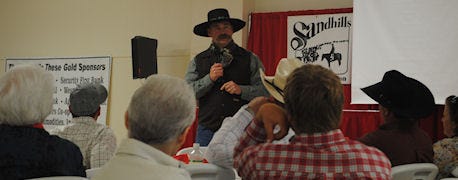
The word "sustainable" should be embraced by beef producers. That's what Montana-based livestock sustainability consultant, Jude Capper, told members of the Sandhills Cattle Association at their 75th annual summer convention in Valentine recently. "To me, sustainable means to last or continue for a very long time," Capper told the group. "We wouldn't be raising cattle in the same places for 100 or 200 years if we weren't sustainable. The beef industry is inherently sustainable," she said. "But how do we convince our opponents?"

Trent Loos says cattlemen "need to exercise their right to be heard."
Capper said that any beef production system can be sustainable if it maintains three basic components, including economic viability, environmental responsibility and acceptability by consumers. "Beef producers are strong and adaptable," she said. "They want to pass on their legacy to their kids and grandkids so they can keep doing what they are doing. If you don't have economic viability you are out of business," Capper explained. "If you don't care for the environment and you overgraze or abuse the land, we don't have an industry."
As for acceptability by consumers, Capper contends that people still love beef. "We turn sunshine into steak. Others can't do that," she said.
Capper told ranchers that they need to take the sustainable label and talk to consumers about it. "Activist groups are smart," she explained. They utilize outdated data to make their own points. "In the absence of other data, people will believe them," she said. According to the Environmental Protection Agency, the carbon footprint of beef is miniscule, contributing a total of only 2.1% of greenhouse gases, compared with so many other industries that create more of a footprint but generate far less attention and far less good in the world.
Trent Loos, Sandhills rancher and popular agriculture radio personality, told convention attendees that consumers don't realize all of the products that come through the livestock industry, including food, fuel and pharmaceuticals. "If you take a three ounce serving of beef steak, there is not three ounces of any other substance on earth that has a smaller carbon footprint and more nutritional content," Loos said. "We raise cattle and produce beef to improve the planet and improve human health. That's why we raise cattle."
Because of improvements in grazing systems, ranchers are able to supply three times more food than in 1951 when the nation's breeding beef herd was the same size as it is today, and they use less land to do it, Loos said. But misinformation about production agriculture and farmers and ranchers is abundant.
"Stand up and be heard," he encouraged producers. "We always complain about what some consumers are saying about us, but we need to exercise our right to be heard," he said.
Capper agreed. "People trust doctors and they trust farmers and ranchers," she said. "They don't trust politicians or the media." She said that the best way to get the agriculture message across to consumers is one on one and through the use of social media.
"We are more efficient than previous generations," Capper said. Through the use of health, technology and genetics, cattle produce more pounds of beef today using less land and less water than ever before.
At their 75th annual business meeting in Valentine, members of Sandhills Cattle Association elected new officers, including Neil Jorgenson of Callaway as the incoming president, replacing outgoing president, Dave Nichols, Chambers.
Vice president is Tim Shaw of Bassett, and the new treasurer is Shane Kime of Nenzel. Ronna Morse, Valentine, serves as the organization's secretary/manager. In addition to the current board of directors, two new directors were elected--Ken Pelster, Bartlett, and Bonnie Downing, Dunning.
You can learn more about the SCA convention and the organization by going online at www.sandhillscattle.com.
About the Author(s)
You May Also Like






